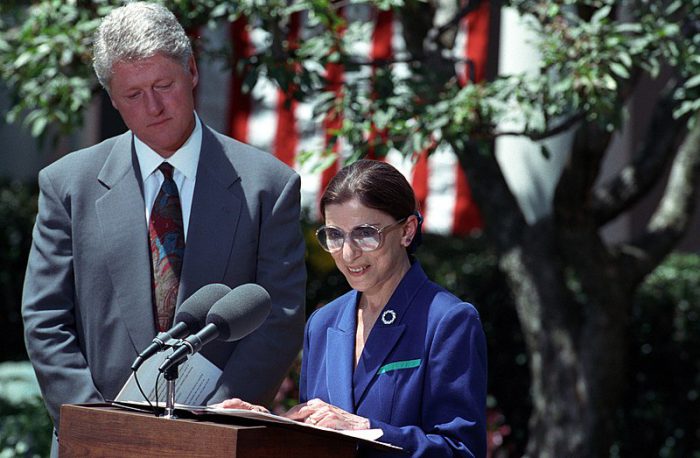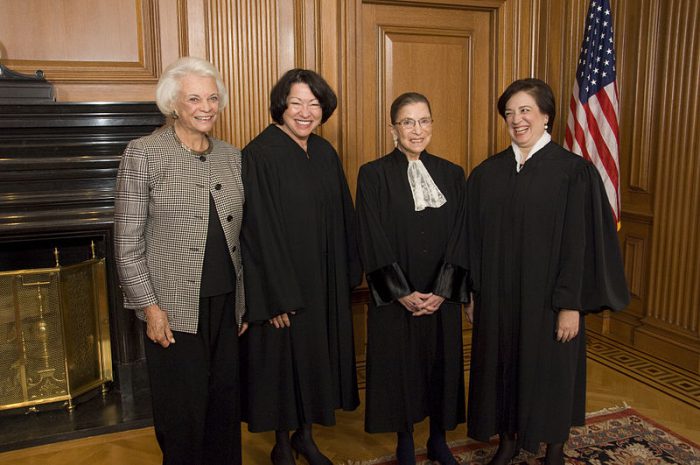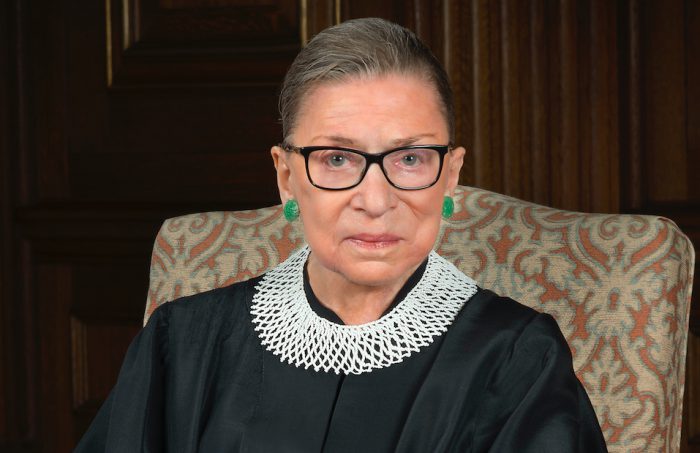Last Friday, September 18, U.S. Supreme Court Justice Ruth Bader Ginsberg died after many years battling cancer. At 87, she was the oldest of the nine justices, or judges, of America's highest court when she passed away. She was also by far its most famous.
Also known by her initials—RGB—Ginsberg was only the second woman ever to serve as a Supreme Court justice. That alone made her noteworthy. But when she was appointed to the court in 1993 by President Bill Clinton, it wasn't the kind of news that made her a part of pop culture.
So how did she become such an icon, the subject of memes and mugs, shirts and slogans? And how did her death create a moment that is right now shaking the entire United States?
Law school pioneer
Part of a memorial to RBG left at the steps of the Supreme Court. The sign has one of her most famous quotes: "Fight for the things you care about, but do it in a way that others will join you." (Getty Embed)
When Ginsberg decided to pursue a law career in the 1950s, she did not have a lot of women to look up to. Being a lawyer was not seen as a woman's job to hold. She was a brilliant student, but was constantly questioned and shunned. While at Harvard, she was even asked by the dean of the law school, "Why are you at Harvard Law School, taking the place of a man?"
Despite this prejudice, she graduated in 1959 from Columbia University tied with another student for first in her class. Even then, she found that not a single law office in New York City would hire her. Instead, she got a job as a law clerk—this is an assistant to a judge.
Taking women's rights to the court
By the early 1970s, Ginsberg had spent many years as a law professor. She still had not joined a law firm. Instead, she started to work as a litigator for a civil rights group, the American Civil Liberities Union (ACLU).
A litigator is a lawyer who specializes in taking lawsuits—where one person is taking legal action against people or organizations—and arguing them in court. Ginsberg zeroed in on cases that were important to women's rights. And she often argued them before the Supreme Court. Across the 1970s, she argued six cases there and won five of them. Her victories brought women—and in one case, men—important new legal rights and protections that hold to this day.
Justice Ginsberg

Ginsberg is nominated to the Supreme Court in 1993 by President Clinton. (Wikimedia Commons)
In 1980, Ginsberg was appointed as a judge of the US Court of Appeals for the District of Columbia Circuit. That's a real mouthful, but her new position gave her valuable experience that would later get her on the Supreme Court.
After 13 years there, an opening on the Supreme Court appeared when Justice Byron White retired. By the time President Clinton interviewed Ginsberg for the job, he found that the trailblazing litigator for women's rights had built a reputation as a thoughtful, cautious judge. In other words, she was well balanced—progressive, but also patient.
"I dissent"

Ginsberg with the other three past and present female justices—left to right, Sandra Day O'Connor, Sonia Sotomayor, Ginsberg, Elena Kagan. (Wikimedia Commons)
Ginsberg's career on the Supreme Court spanned 27 years. An early landmark case (a court case that is studied because it has historical and legal significance) came in 1996, when she wrote the court's decision that allowed women to attend one of the country's most prestigious all-male schools, Virginia Military Institute.
Over time, several other justices left the court and were replaced by new additions, including two other women—Sonia Sotomayor in 2009 and Elena Kagan in 2010. But the balance of the nine justices also changed, falling more in favour of conservative opinions. Ginsberg found more and more that she was arguing against what most of her colleagues decided.
This led to her writing many dissentions—this is when a justice expresses in writing why they feel that the majority decision of the justices is wrong. It is like an official protest. Though it doesn't change the outcome of decision, it does produce debate.
For the people who agreed with Ginsberg on a particular case, it also gave them a voice. She began to gain new popularity as an advocate for not only women, but other minorities in American society who felt they weren't being heard.
An important shift
The Supreme Court as it appeared in 2018. (Getty Embed)
Now that Justice Ginsberg has died, many Americans feel as though they have lost that hero. RBG was a quiet person whose voice nevertheless carried great weight. But her death may also create a huge imbalance in the court.
The U.S. Supreme Court is the final voice on countless important issues, especially civil rights. Justices are given life terms (once appointed, they serve until they die or retire) and are appointed by the president. This is done to try to avoid biases—though the presidency changes every four years, the Supreme Court's makeup is designed to be longer lasting.
But sometimes, situations arrive that allow a president to appoint several justices in quick succession. This is what has happened with President Trump. Despite serving just one term, he has already appointed two new justices, Neil Gorsuch and Brett Kavanaugh. Now, with the election under two months away he has a chance to appoint a third. If he does, this will be considered a major victory for the Republican Party, as it would bring the balance of justices to six conservative versus three liberal.
Many Americans are worried that a more conservative Supreme Court could lead to the loss of a certain right, which is a reasonable fear. Ginsberg herself expressed in a final statement that: "My most fervent wish is that I will not be replaced until a new president is installed."
For the next few weeks, when and by whom she is replaced will be a central debate in American politics.
 Ruth Bader Ginsberg was a trailblazer, but also a cautious, thoughtful justice. (Wikimedia Commons)
Ruth Bader Ginsberg was a trailblazer, but also a cautious, thoughtful justice. (Wikimedia Commons)









